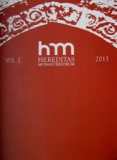Memoriał z 11 VIII 1820 r. o stanie zagospodarowania majątków poklasztornych przez Deputację Spraw Zniesionych Instytutów Duchownych
Memorial of 11 August 1820 on the management and development of post-dissolution monastic estates by the Deputation for the Affairs of Dissolved...
Author(s): Małgorzata KośkaSubject(s): History
Published by: Laboratoire de Recherches sur l'Histoire des Congregations et Ordres Religieux (LARHCOR)
Keywords: Deputation for the Affairs of Dissolved Religious Institutes; dissolution; monastery; Kingdom of Poland; Central Archives of Historical Records; source; edition; memorial
Summary/Abstract: On 30 March 1819, the Governmental Commission of Religious Affairs and Public Enlightenment of the Kingdom of Poland, planning out the dissolution of some of the monasteries in the Kingdom of Poland, requested Governor (namiestnik) Józef Zajączek that a deputation be set up which would devise a project of temporary –and, subsequently, permanent– management and administration of the funds of suppressed institutes, and be responsible for a special fund which would collect the revenue from former monastery estates. On 3 April 1819, in a session of the Administrative Council of the Kingdom of Poland, the Governor established the Deputation for the Affairs of Dissolved Religious Institutes. It was headed –ex officio– by minister of denominations Stanisław Kostka Potocki, and consisted of the primate of the Kingdom of Poland, and four members of the Governmental Commission of Religious Affairs and Public Enlightenment. In accordance with the Governor’s decision, the first task of the Deputation was to frame a project of temporary administration of the funds of suppressed monasteries and benefices, and –subsequently– develop projects concerning: means of support for nuns and monks from dissolved houses, the management of their buildings, the situation of peasants in former monastery estates, and the ultimate distribution of assets acquired in the process of dissolution. The Deputation was supposed to appoint a candidate –for the Governor to approve– for the general commissioner, whose scope of responsibilities included: visiting estates (field inspections), making sure they were being managed in a proper way, settling accounts with tenants, as well as adjudicating disputes and addressing complaints on the premises. As early as 11 May 1819 minister Potocki informed the Governor that the Deputation had devised the plan for temporary administration of the property of suppressed monasteries, and that work on projects for regional (voivodship) commissions, as well as for commissioners appointed to take over the funds of dissolved monasteries and to secure the revenues, was in progress. The Administrative Council, during the session on 15 June 1819, examined a draft bill concerning the legal status of the estate of suppressed monasteries. On 26 June 1819 the Governor, in turn, issued a resolution in which he ensured that the estates, funds, and property of dissolved religious congregations were to be treated equally with state property. In May 1821, minister of denominations Stanisław Grabowski put forward a proposal to the Governor to disband the Deputation,arguing that the dissolution process –in the religious terms– had come to an end, and since the papal legate was a member of the Governmental Commission of Religious Affairs and Public Enlightenment, the affairs regarding the administration of post-monastic estates could be dealt with by the Commission itself. The Governor’s resolution from 29 May 1821 disbanded the Deputation for the Affairs...
Journal: Hereditas Monasteriorum
- Issue Year: 2013
- Issue No: 2
- Page Range: 291-310
- Page Count: 20
- Language: Polish

